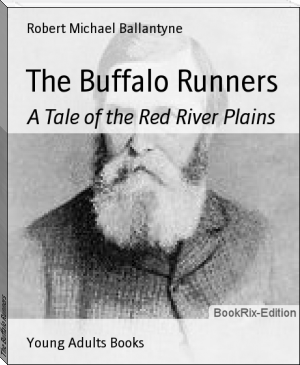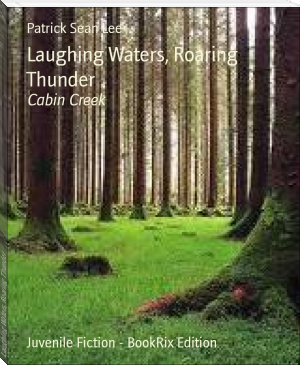The Buffalo Runners, Robert Michael Ballantyne [best fiction novels of all time .txt] 📗

- Author: Robert Michael Ballantyne
Book online «The Buffalo Runners, Robert Michael Ballantyne [best fiction novels of all time .txt] 📗». Author Robert Michael Ballantyne
While this was being constructed the elder brother went down to the edge of the water and made half-a-dozen mud-heaps well within gunshot, which when the artificial heads and necks were attached to them, formed such exact counterparts of geese that the wild birds might well be excused for mistaking them for friends. Indeed tyros at this work have been known to fire at such decoys believing them to be genuine birds.
Even while they were thus engaged one and another flock of ducks and geese passed them on their way to warmer climes; of course sheering off as they passed. But when the arrangement was completed, and the two boys, crouching low, gazed at the horizon with eager looks, the wild birds no longer avoided the spot. On the contrary, seeing the decoys, they rather inclined to pass close to the place.
In flying down a river, or along the margin of a lake, wild birds may diverge a little to follow the sinuosities of bank or shore, but they will not get out of the way of a projecting promontory; they rather make a short cut by crossing over it.
The young hunters had not to wait long.
"There's a flock of geese coming," said Archie in a whisper, though the birds were at the moment some miles away. "Take the first shot, Little Bill."
They had only one gun between them.
"I don't like to," said Billie, "that thing gave me such an awful kick last time, and I can't stand it now."
"O! there's no fear, I put in only a small charge of powder-and-shot, on purpose. It won't kick hard this time. Try."
"Well, I'll try," said Billie, taking the gun.
"Aim well in advance, Bill. They fly fast, and primin' gets damp sometimes."
A flock of small geese was approaching. The boys became dumb, but they had remarkably speaking eyes.
Animated by curiosity, the flock descended to observe the decoys. How often that feeling of curiosity has proved fatal--not only to feathered geese!
Little Bill raised his gun. Puff! went the priming. Bang! went the charge. One of the birds, describing a beautiful curve, fell with bursting violence on the ground.
"Well done, Billie," cried his brother enthusiastically as he leaped over the sheltering brush and ran to secure the prize. "A few like that will give a supper to the whole camp. Now, then," he added on returning, "you'll try again."
"No, Archie. It's your turn now--and the thing _did_ give me a tremendous kick."
"But I will put in still less powder this time, Little Bill, and less shot too, so you'll have to be careful of your aim. See, there's another flock coming--there, take it, and down with you. I do believe they are big fellows."
Thus encouraged, Billie took the gun and crouched low. His brother was right. It was a flock of the great grey geese of Canada which now approached. The hearts of both boys beat high, for they were not only actuated by what is termed the sporting tendency, but by the desire to contribute their fair share to the general larder of their friends, who were encamped a considerable distance off at the other end of the lake.
"Okematan will open his eyes if we take back a goose or two like these; why, they are swans almost!" whispered Archie, as the birds approached in the form of an angle. "Take the big fat one on the left--the one now squintin' down at the decoys."
Billie obeyed, and fired. The result was, in a manner, threefold. First, the boy's aim was so good that the big fat fellow dropped like a stone not three yards from their position. Second, the hitherto silent and symmetrically arranged flock went into dire confusion and sheered off in trumpeting convulsions; and, third, a scattering shot, having found its billet in the head of another goose immediately behind the first one, caused it to plunge right into the camp, straight for the head of Little Bill. Archie, ignorant of this, was in the very act of leaping over the brush to secure the first goose, and had fortunately got in front of his brother at the right moment when the second goose caught him on the shoulder and knocked him into the poor invalid's arms.
He was stunned at first, and rose in a few moments in some degree of mental confusion; but he was not much the worse for the accident and greatly rejoiced at his fortunate escape, as well as the splendid shooting, of Little Bill.
It must not be supposed that the brothers continued to shoot at this rate. Comparatively few flocks of geese passed over Willow Point that day, but numerous flocks of wild-ducks did, and before evening had put an end to their work, they had secured a fair canoe-load of game.
That night they lighted their camp-fire among the neighbouring willows; feasted luxuriously on part of the day's hunt; lay down side by side under one blanket, with the upturned canoe partially covering them; dreamed at first of Okematan, gazing in wonder at their load, and, afterwards, of being knocked head over heels by an enormous grey goose whose persistent pugnacity was only equalled by its strange incapacity to achieve its murderous ends.
Ultimately Oblivion came to their rescue, and the young hunters fell into a dreamless slumber, with the smoking camp-fire sending an occasional gleam of ruddy light on their recumbent forms, and the dark sky with its hosts of twinkling stars serving for a gorgeous canopy.
CHAPTER ELEVEN.
SHOWS SOME OF THE TROUBLES OF PIONEER COLONISTS.
Okematan was not the only person who opened his eyes on the return of the Sinclair boys to camp next day with their heavily laden canoe. The Davidson and McKay families were much more emphatic in their astonishment, for the boys, they knew, had not hitherto performed any exploits in shooting. They had not supposed them gifted with even ordinary powers as sportsmen, and had imagined that the poor invalid little Bill was utterly helpless. On the other hand, Okematan was not unacquainted with the sudden rise to unexpected celebrity of Indian boys in his tribe, and knew something about the capacity of even cripples to overcome difficulties when driven by that stern taskmaster, Necessity.
The abundant supply of provisions thus unexpectedly received was very acceptable, because during the day on which the boys were absent, a fresh band of immigrants had arrived on their way to Red River, and one party of these, hailing from Switzerland, had come on to the little lake where our Scotch friends were encamped, for the purpose of consulting as to their future movements--for it was evident that it would be dangerous as well as useless for them to proceed to Red River in the existing state of affairs. The leader of the party was a fair-haired youth, who could speak English very well.
The Scotch families were having their mid-day meal around the camp-fires, when the Switzers arrived and introduced themselves. Of course they were made heartily welcome by Mr Sutherland, who acted as spokesman for his countrymen.
"We are unfortunate," said the leader of the new arrivals, whose name was Andre Morel. "We hoped that the severe climate would be our only foe to fight with--especially in a land where the people are so few."
Sutherland--whose sedate and quiet manner was consistent with his position as an elder and spiritual guide of his countrymen at that time--smiled gravely, shook his head, and stroked his chin.
"You will find," he said, "that whatever part of this world you go to, the passions of man are always more deadly in their consequences than surroundings, or climates, or anything else."
"H'm! what you say iss ferry true," remarked old McKay, who was busy picking the drum-stick of a wild-goose at the moment. "If it wass not for the jealousy an' ill-will o' the North-Westers we should hev been at this goot hour in our comfortable houses amang the green fields of Rud Ruver."
"Wheesht! faither!" interposed Duncan junior, "Mr Sutherland wass speakin', an' ye've stoppit him."
"An' what if I hev, Tuncan? Can he not continoo to speak when I hev done?" retorted the old man, resuming his drum-stick.
"You are right, Mr McKay," said the elder. "But for the unfortunate jealousies of the two Companies, we might have been in very different circumstances to-day. If the North-Westers could only see that the establishment of a colony in Red River would in no way hinder the fur-trade, we could all get along peaceably enough together. But it seems to have been ordained that man shall reach every good thing through much tribulation."
"I do not agree wi' you at all, Muster Sutherland," said old McKay. "There iss many of rich people in this world, who hev all that hert can wush, an' are born to it without hevin' any treebulation at all."
"But I did not say `all that heart could wish,' Mr McKay. I said `_every_ good thing'."
"Well, an' iss not wealth a goot thing, Muster Sutherland?"
"Only if God's blessing goes along with it," returned the elder. "If it does not, wealth is a curse."
"H'm! I wush I had a little more o' that curse--whatever," answered the irreverent old man.
"Besides," continued Sutherland, not noticing the remark, "the rich are by no means exempt from tribulation. They are sometimes afflicted with bad children; not infrequently with bad health, which doctors, at two or three guineas a visit, cannot cure, and many of them are much troubled with poverty!"
"You are talking in ruddles now, Muster Sutherland," said old Duncan, who, having finished the drum-stick and its duplicate, was preparing his pipe for action.
"It is not much of a riddle, Mr McKay. I suppose you consider a man with ten thousand a year rich, and a man with two hundred poor."
"Well, yes; I wull not be denyin' that."
"Well--if the rich man spends ten thousand and fifty pounds a year and never has anything to spare or to lay by, is he not miserably poor--poor in spirit as well as in purse? For, at the end of the year his purse is empty, and he is in debt. On the other hand, if the man with two hundred a year spends one hundred and fifty, gives away twenty, and lays by thirty every year, is he not rich?"
"Ferry true, Muster Sutherland," said McKay, with a peculiar smile, as he emitted his first whiff. "I wull not be arguin' wi' you, for you always get the best of it. Nevertheless, it is my opeenion that we've had treebulation enough in Rud Ruver since we came oot, an' I would be ferry gled of a luttle prosperity now--if only by way of a pleesant change."
Recurring to this subject a few days later, young Morel asked Dan Davidson, while they were paddling back to camp together one evening with the proceeds of a day's hunt: "Has your life in the colony, since the beginning, been as bad as old McKay





Comments (0)